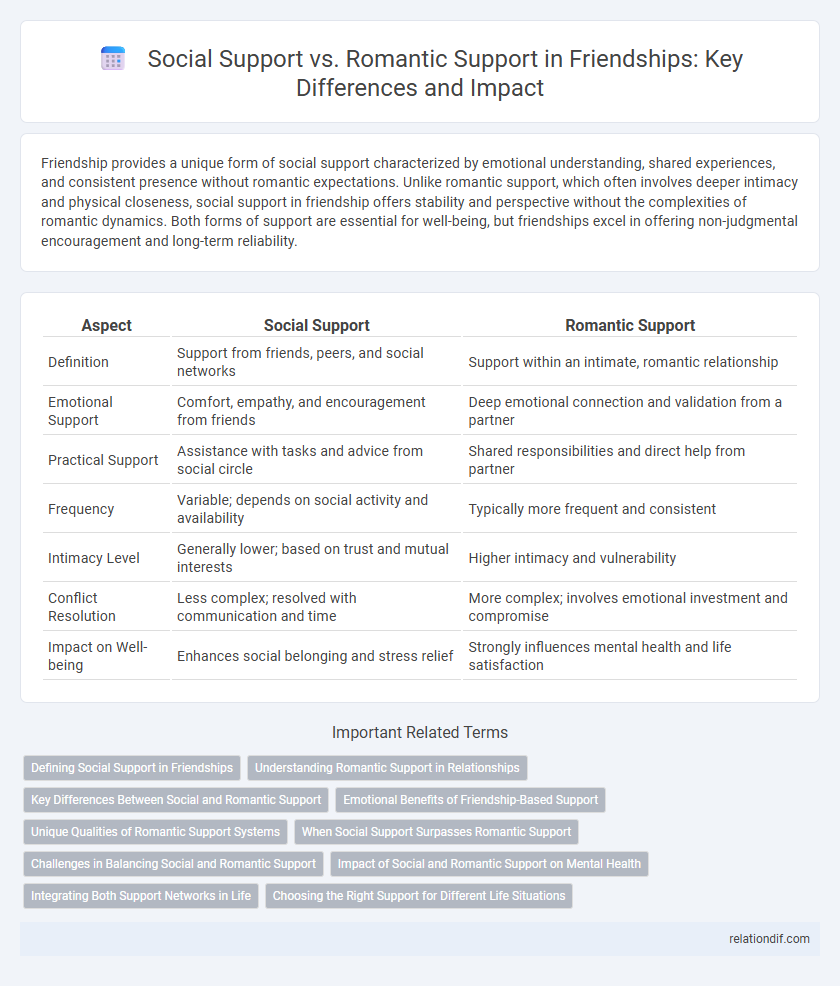Friendship provides a unique form of social support characterized by emotional understanding, shared experiences, and consistent presence without romantic expectations. Unlike romantic support, which often involves deeper intimacy and physical closeness, social support in friendship offers stability and perspective without the complexities of romantic dynamics. Both forms of support are essential for well-being, but friendships excel in offering non-judgmental encouragement and long-term reliability.
Table of Comparison
| Aspect | Social Support | Romantic Support |
|---|---|---|
| Definition | Support from friends, peers, and social networks | Support within an intimate, romantic relationship |
| Emotional Support | Comfort, empathy, and encouragement from friends | Deep emotional connection and validation from a partner |
| Practical Support | Assistance with tasks and advice from social circle | Shared responsibilities and direct help from partner |
| Frequency | Variable; depends on social activity and availability | Typically more frequent and consistent |
| Intimacy Level | Generally lower; based on trust and mutual interests | Higher intimacy and vulnerability |
| Conflict Resolution | Less complex; resolved with communication and time | More complex; involves emotional investment and compromise |
| Impact on Well-being | Enhances social belonging and stress relief | Strongly influences mental health and life satisfaction |
Defining Social Support in Friendships
Social support in friendships encompasses emotional, informational, and practical assistance provided by friends during times of stress or need. It differs from romantic support by emphasizing platonic trust, common interests, and mutual respect without the complexities of romantic attachment. This type of support enhances mental health, fosters resilience, and strengthens interpersonal bonds through consistent empathy and encouragement.
Understanding Romantic Support in Relationships
Romantic support in relationships involves deep emotional understanding, attentive communication, and shared vulnerability that strengthen intimacy beyond general social support. Unlike friendship, romantic support often includes navigating complex emotions such as passion and jealousy while fostering mutual growth and trust. Prioritizing empathy and consistent reassurance in romantic support significantly enhances relationship satisfaction and resilience.
Key Differences Between Social and Romantic Support
Social support primarily involves providing emotional comfort, practical assistance, and a sense of belonging through friendships and community networks, whereas romantic support often includes deeper intimacy, exclusive commitment, and mutual validation within a couple's relationship. Key differences include the scope of emotional involvement and expectations; social support tends to be broader and less intense, while romantic support carries higher expectations for loyalty, physical affection, and long-term partnership. The dynamics in romantic support emphasize mutual dependency and shared future planning, contrasting with the more flexible, diverse interactions found in social support systems.
Emotional Benefits of Friendship-Based Support
Friendship-based support provides consistent emotional benefits such as increased resilience, reduced stress, and a stronger sense of belonging that differs from romantic support by emphasizing mutual understanding without romantic expectations. Studies show that friends offer unbiased encouragement and validation, promoting mental health through shared experiences and empathetic listening. Unlike romantic relationships, friendships often sustain long-term emotional stability by providing a reliable network for coping with life's challenges.
Unique Qualities of Romantic Support Systems
Romantic support systems offer unique qualities such as deep emotional intimacy and sustained physical closeness that enhance resilience during stress. Unlike general social support, romantic partners often provide continuous, personalized encouragement and validation, fostering a profound sense of security. These exclusive dynamics contribute to improved mental health outcomes and stronger relationship satisfaction.
When Social Support Surpasses Romantic Support
Social support often surpasses romantic support by providing a broader network of emotional assistance and practical help that is less conditional and more consistent over time. Close friendships foster a sense of belonging and validation that can be more reliable during stressful life events, as friends offer diverse perspectives and shared experiences beyond the intensity of romantic relationships. Research shows that strong social connections contribute significantly to mental health and resilience, often buffering the negative effects of breakups or romantic conflicts more effectively than romantic partners alone.
Challenges in Balancing Social and Romantic Support
Balancing social and romantic support often presents challenges as individuals navigate contrasting expectations and emotional needs within each relationship type. Social support networks typically provide broad encouragement and diverse perspectives, while romantic support demands intimate understanding and consistent availability. Differences in communication styles and time allocation can strain both friendships and romantic partnerships, requiring careful prioritization and emotional management.
Impact of Social and Romantic Support on Mental Health
Social support from friends provides emotional stability, reduces stress, and enhances resilience by fostering a sense of belonging and acceptance. Romantic support often involves deeper emotional intimacy and physical affection, which can significantly lower anxiety and depression levels. Both types of support contribute uniquely to mental health, with social support promoting broader social integration and romantic support offering personalized emotional validation.
Integrating Both Support Networks in Life
Balancing social support from friends and romantic support from partners enhances emotional resilience and well-being by providing diverse perspectives and sources of empathy. Integrating both networks involves fostering open communication and trust, ensuring needs are met through complementary support systems. This holistic approach strengthens interpersonal bonds and promotes mental health by leveraging the unique benefits of friendship and romantic relationships.
Choosing the Right Support for Different Life Situations
Friendship provides essential social support by fostering emotional connection, trust, and shared experiences, which are crucial during times of personal growth or everyday challenges. Romantic support often offers deeper intimacy and commitment, beneficial in navigating complex emotional or life-altering situations such as relationship dilemmas or major decisions. Choosing the right support depends on the specific life context, where social support nurtures resilience and well-being, while romantic support addresses nuanced emotional needs and long-term partnership dynamics.
social support vs romantic support Infographic

 relationdif.com
relationdif.com